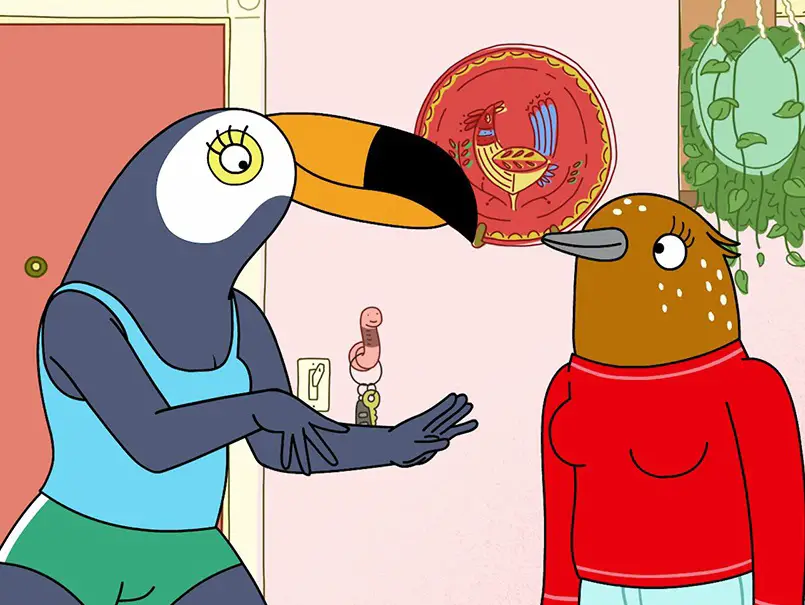“Tuca & Bertie,” the newest adult animation on Netflix, is the brainchild of Lisa Hanawalt, the production designer and art designer for “Bojack Horseman.” The show places the viewer in the mind of two anthropomorphic birds, who live in a dystopian millennial environment, and touches upon many different issues that our own society is facing, such as women’s rights, mental health, abuse and addiction.
Tuca (voiced by Tiffany Haddish) and Bertie (voiced by Ali Wong) are lifelong friends and former roommates, who move on to the next chapter in their lives when Tuca moves out and Bertie starts living with her boyfriend, Speckles.
Tuca is an extroverted toucan defined by her energetic and loud demeanor. The show juxtaposes her outgoing nature and her former alcoholism; Tuca is six months sober and struggles with continuing her social and personal lives without alcohol. She is messy and doesn’t have her life together; she keeps trash from the street and doesn’t have a real job, but instead, she gets checks from her rich aunt to pay for her apartment and lifestyle.
Bertie is an anxious, mild-mannered songthrush who works as a data analyst for a magazine company, with a hidden passion for baking, which she explores as an apprentice at a bakery. Bertie feels uncomfortable in the workplace, which reflects how women feel in a male-dominated workplace.
Tuca and Bertie go out into the crazy world they inhabit, which challenges their weaknesses and forces them to mature. They both are in their 30s, and their problems throughout the show are meant to reflect the problems millennials face and the issues millennials are advocating for.
For instance, the episode “Plumage” takes a look at Tuca’s former alcoholism through the lens of her alcoholic aunt. In all of Tuca’s previous visits, she gets drunk with her aunt, but during this episode Tuca has to secretly abstain from drinking. At the end of the episode, Tuca reveals that she has been six months sober and decides to stop receiving checks from her aunt, taking the first steps toward maturity.
Bertie never stands up for herself and, as a result, is walked on by different characters throughout the show. In the episode “The Promotion,” a male coworker, who is literally a cock, steals her idea and makes a suggestive comment to her. Bertie goes to the H.R. representative, who is unwilling to help and is dismissive of how Bertie feels. Tuca decides to become a temp for Bertie’s office and helps her friend out, and when Bertie finally stands up for herself, the coworker gets fired.
“The Sex Bugs” takes a serious look at mental health. When Bertie skips work and her big presentation due to her anxiety, Tuca drags Bertie out of her apartment to go to the grocery store and buy cream for Tuca’s so-called sex bugs. Tuca goes to the bathroom to apply the medication, and Bertie has a panic attack, which is played out in a vivid musical scene. The sex bugs grow to human size and start destroying the grocery store, and they are taken to court. Tuca has Bertie represent them, and she wins the case. Thanks to Tuca, she doesn’t think about her anxiety during the whole trial.
The way issues are tackled throughout “The Promotion” and “The Sex Bugs” sets a pattern for the way Bertie’s issues are tackled in other episodes: usually, Tuca pushes Bertie to get over her problems. Then, at the end of the episode “Yeast Week,” Tuca and Bertie get into a big fight about their co-dependence. Their separation goes on for a couple of episodes before they are able to reflect on their argument.
Tuca and Bertie finally reconcile during the episode “The Jelly Lakes.” Bertie returns to her family’s home at the lake where, when she was a teenager, she attempted to swim across to a distant island. On the day she was going to accomplish this, she was sexually assaulted, and Bertie realizes that this is what has been holding her back and causing her anxiety. At the end of the episode, she swims to the island and gets over her fears.
There are a lot of similarities between this show and “Bojack Horseman.” Both shows have anthropomorphic animals as characters, and the character design is very similar, but in case you were wondering: no, the shows don’t take place in the same universe.
“Tuca & Bertie” is an animated sitcom, which ties in serious societal issues throughout some of its episodes, while “Bojack Horseman” is a dark comedy, where its serious moments are based on the characters’ actions and past.
The animation and set design of both shows are extremely different; “Bojack Horseman” follows a more linear shot design, with lots of shots focusing on the characters. The sets seem to replicate real life much more than “Tuca & Bertie.” And scene transitions in “Bojack Horseman” look like they were shot in real life, while the transitions in “Tuca & Bertie” take advantage of the medium.
Most adult animation that has come out in the past five years looks basic and doesn’t take many risks with the art design, but the art and animation in “Tuca & Bertie” are top-notch and original. The backgrounds are lively, and each character looks unique. Many scenes are visually striking and will have you want to re-watch the show just to appreciate the visuals.
“Tuca & Bertie” is a heavy show in some aspects, but it’s also funny and quirky in other aspects. The show is filled with light-hearted humor, and the characters are extremely likable. It is one of the few adult animations where the visuals actually develop the humor and dialogue. Any fan of “Bojack Horseman” will definitely enjoy this show.
A second season hasn’t been confirmed yet, but it’s likely that one will be announced within the next couple of months.
















